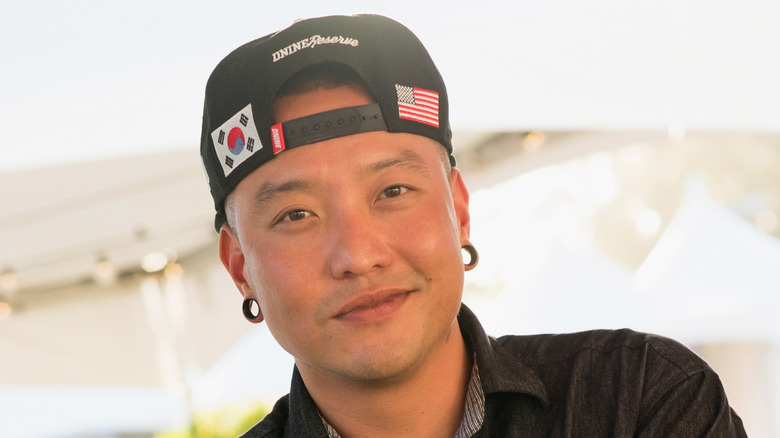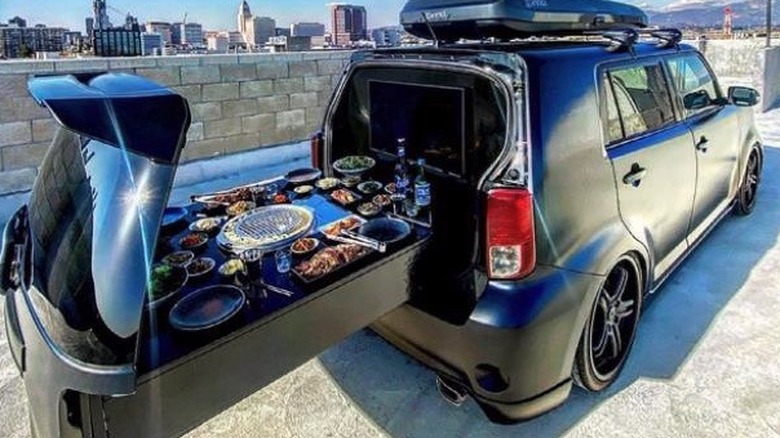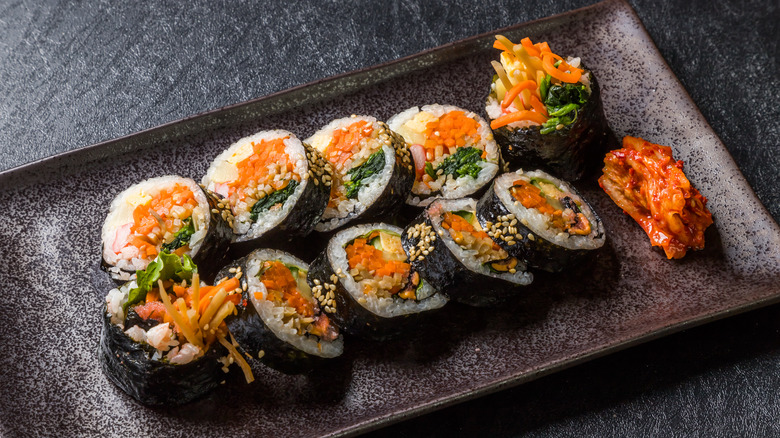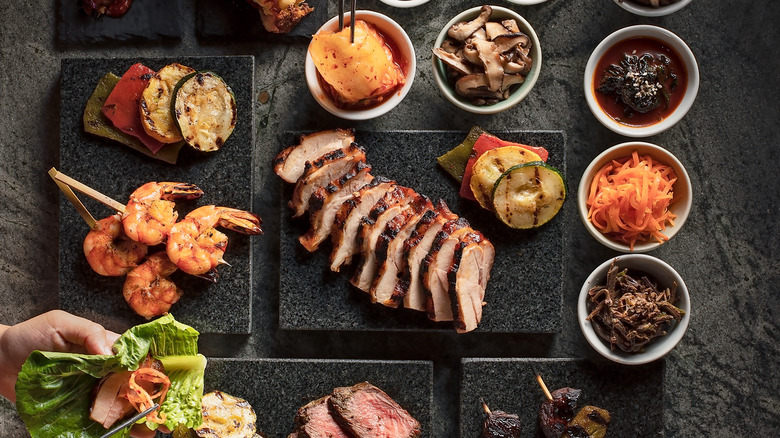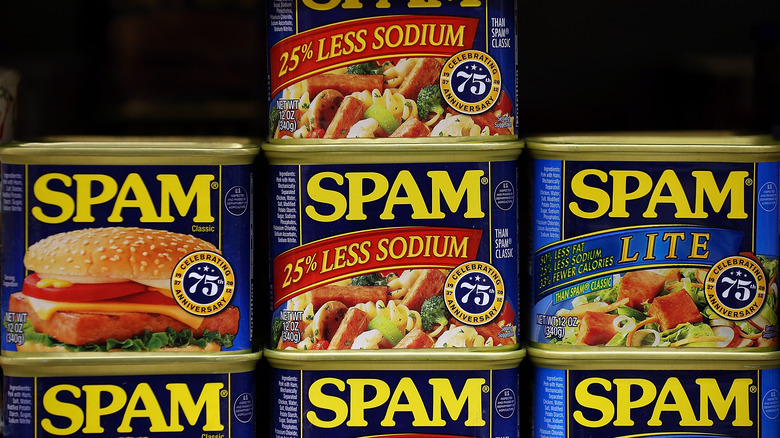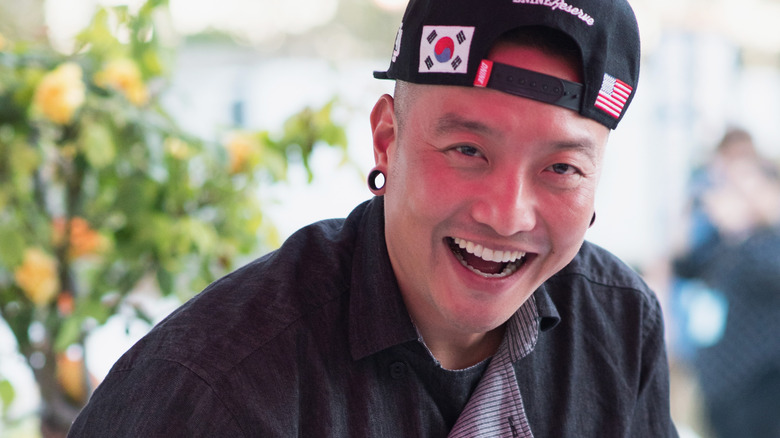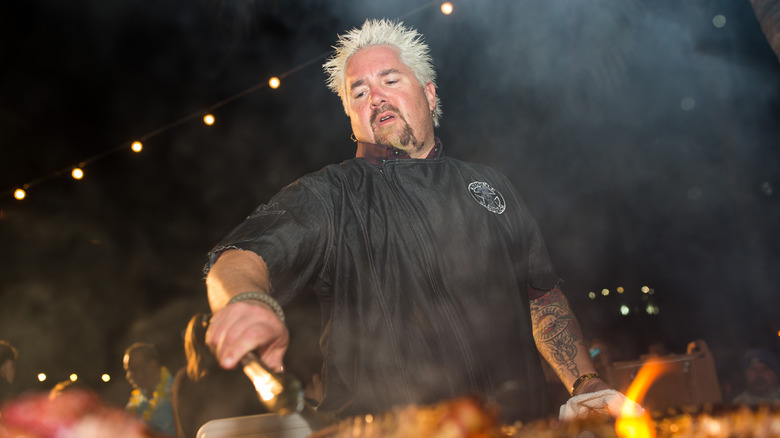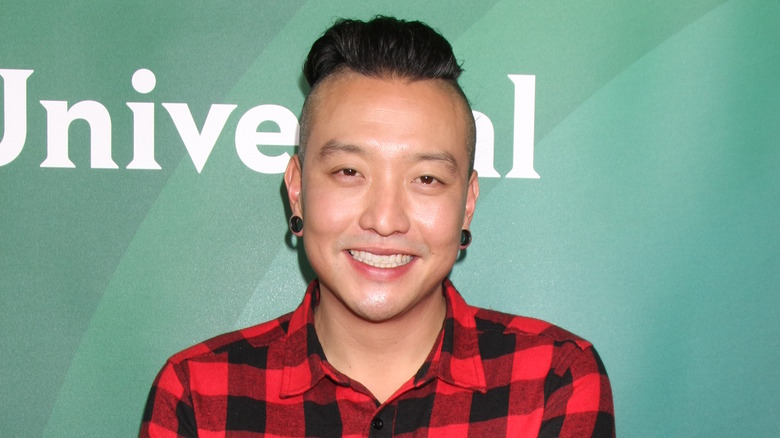Chris Oh Talks Korean Food And How He Got Into The Food World - Exclusive Interview
These days, Chef Chris Oh is a well-known entity to just about anyone who follows the food world all that closely. He has restaurants in California and Hawaii, you may have seen him on Bravo's "Top Chef," Food Network's "Grocery Games," on "Kitchen Inferno," or other TV shows, and you may even be a customer of KPOP Foods, the Korean food company for which Oh is the head of product and product development. But as the energetic and always smiling chef told Mashed during a recent interview, he almost never got into the culinary world at all, and he was a latecomer to the game regardless.
Whereas most chefs who make a mark in the food world come up through kitchens starting off at an early age, Oh went to college then started a couple of businesses completely unrelated to food, working as a self-employed entrepreneur throughout his 20s and into his early 30s. But a love for food and a fascination with the larger culinary world was always there under the surface, and fortunately for the rest of us, eventually it emerged.
We talked to Chris Oh (who self describes as "a chef, restaurateur, TV personality, all around hustler, with restaurants, food lines, TV shows, gigs, Korean barbecue car, — you name it, I got it!") about everything from how he finally got into cooking, what he wishes more people knew about Korean food, the cuisine of his heritage and of his professional life, about cooking on TV, including with celebrity chefs like Guy Fieri, and about why he converted a Scion xB into a mobile Korean restaurant.
Chris Oh on converting a Scion xB into a mobile Korean restaurant
Where did the idea for the barbecue car come from and what has the reception been like so far?
Well, the barbecue car was born out of the pandemic to be honest with you. Korean barbecue was one of those things that you had to really experience at a Korean barbecue restaurant, and with COVID and the pandemic, you couldn't go to Korean barbecue. So one day I decided, I was like: "Hey, why don't I just bring Korean barbecue to the people?"
And we had a car, then we got some builders on board and we built literally a mobile Korean barbecue table. We drive it to your house. We just did an event yesterday in Pacific Palisades looking over the ocean. And honestly, it's gone viral. It's blown up. Who wouldn't want to eat Korean barbecue off the back of a car, looking over the sunset?
Chris Oh talks about Korean kimbap
What is kimbap and what do you want people to understand more about this Korean classic?
So I hate to generalize kimbap, but it almost... it looks like sushi, [but] it definitely isn't sushi. It's one of those Korean staples. I would like, if I had to compare it to something American, it's American as almost a hot dog. Kimbap you could take with you on a picnic. You eat them at the baseball games or you can take them on hikes. It's just one of those snacks that you buy at the store, you can make it, you go on a hike, you pop one in your mouth and it's just really one of the staple snack foods in Korea.
Are the ingredients always varied or is there certain things that have to be included?
Obviously there's got to be rice. But you can really, like a more traditional one has the vegetables and the cooked meats, but there's different variations you can do like try fish. You can do fish cakes. You can do tofu. Kimbap is one of those dishes where you can be pretty creative and pretty versatile with the dish.
Chef Chris Oh on Korean food and misconceptions about it
What do you wish people understood more about Korean food in general?
Korean food is isn't all about Korean barbecue. As much as I banked on my career and my success off Korean barbecue, I would like to think that it's more like a gateway food to other dishes in Korea. We're really known for our soups, our drinking foods. There's so much more to it [than] just barbecued meats over the grill. We have all these little side dishes called banchans that are very much a staple in the Korean cuisine and whatnot. It's really good. If you like good food, if you like bold flavors and especially hangover food, Korean food is definitely where it's at.
(And for the record, the food can be spelled "kimbap" or "gimbap," with the pronunciation phonetic based on which spelling you use, though the "K" spelling is the more Westernized version. "It's kimbap or gimbap," Chris Oh says, "with a K or a G.")
Chris Oh talks about his enduring love for SPAM
Why does SPAM deserve a closer look and re-evaluation of its place in cuisine?
Okay. So first of all, I don't think it needs a re-evaluation because SPAM has played such a huge part in a role in my life, just growing up. And it's been a staple food throughout my whole life. And as a chef, you look at ingredients and SPAM kind of hits every note of one of those perfect ingredients. It's so versatile. You can deep fry it. You can pan fry it. You can steam it. You can boil it. You can put it into soups. You can put it into sandwiches. You can put it in tacos. It's just one of those ingredients that you don't get with other ingredients and whatnot.
You can easily take like a good piece of meat or a good piece of fish and just let that kind of speak on its own. I really feel like SPAM is kind of very similar stuff because you have the salty notes, you have those textural differences and whatnot. And, personally, every culture that I've seen has definitely used SPAM. Whether it's Korean or Japanese or Mexican, even Hawaiian. Obviously Hawaiian food has got a big staple with the SPAM. So it's just a versatile product. And on top of that, it's very delicious. And it's very easy to cook, too.
How Chef Chris Oh lied his way into the culinary industry
You got your first job in the culinary world by lying on a resume. What was the lie? And did you ever get caught?
Well, obviously I didn't get caught because I've gotten this far, so. No, let's see, what was it like? I was an entrepreneur. I had my own real estate company and a couple of small businesses and whatnot, but I really wanted to get into food and I was definitely late in the game and I just literally just, I think we had the internet back then. I went on the internet, looked up some popular restaurants and just said I worked there and stuff like that. And they never checked. And I got my first kitchen job.
What were your first experiences working in professional kitchens like, especially given that came to cooking later than most people do?
Yeah, honestly, it was hell. I went from owning my own businesses to basically getting yelled at for not cooking the potatoes right or [being told] go cut a bag of onions. And it's just like, I just put my head down and just worked my ass off and just kind of moved up through the ranks.
Chef Oh talks about TV cooking and working with Guy Fieri
What is the most fun you've had cooking on TV?
Whatever show that I'd win.
What was the hardest challenge you've had on a cooking show?
A lot of these shows, there's different aspects of why they're so hard. Just the element of surprise on just like a secret ingredient or a time limit. I've done tons and tons of these shows, but the nerves still get you and definitely get me and looking at my competitors too, it's just, it's like a sport really. And it's just like, there's so many factors that go into it and just got to just try to be more creative and more assertive and just want to win.
Is the experience cooking in front of the cameras or cooking in the kitchen at your own restaurant markedly different or is it essentially still about the food?
That's a good question. After the first initial shock factor, like when you have to cook for a TV show, it's like the muscle memory and like riding the bike kind of thing where you get into it and you forget the cameras are on and it's all about the food because you have to not only compete against these other competitors, but you have to make a delicious dish for these judges as well to judge.
What was it like cooking with Guy Fieri?
Guy Fieri is honestly the same person as he is on TV. He's got great energy. He is a monster. He's like the king of food TV... The great thing about Guy is it's not just about the food. He's got his own product lines and obviously he's got the TV shows and he's a philanthropist. This guy has got, he's like the complete package — and I definitely feel like I've accomplished a lot in my career, but I mean, nothing there like Guy. I am definitely trying to strive for that, for sure.
Who are some other notable chefs with whom you'd like to cook in the future?
Right off the top of my head, Brooke Williamson. She, when it comes to the food world, she kills it on TV and she kills it in real life. I know her personally, she's an amazing chef and amazing person. Nyesha Arrington. She's amazing. And she's half Korean too, which is pretty cool. I'm down for anybody. I'll cook with one of those little kids on Gordon Ramsay's show!
... It's like, the great thing about cooking with other people is you really get to learn about them and their culture and their cuisine or their cooking techniques, and it just makes you a better chef in general.
Chris Oh on favorite foods, least favorites, and tips for home cooks
What are a few mistakes that you see too many amateur chefs making when they're cooking?
Stop watching TikTok cooking videos. No, honestly, I don't really feel like... I encourage mistakes in the kitchen. It's the only way you're going to be able to become a better chef. I still make mistakes in the kitchen, but just go and keep doing it and just experiment, really. Because all the dishes I've come up with, even this, for example, this kimbap dish, I've never made this kind of variation of it. It was just like trial and error and ended up being this amazing looking and tasting dish.
Are there certain cuisines outside of Korean that you most enjoy cooking?
Mexican food.
What is one dish you just never get tired of making?
I think it's got to be just the Korean instant ramen. It's one of those dishes that I've grown up on ever since I was a little kid. I like to put SPAM in it. SPAM definitely is one of those luxuries — I mean I think it's luxurious — those items that you put into creating ramen because you can put eggs, you can put SPAM, you can put cheese and all that stuff.
And I was thinking about it. It's just a very comforting dish. I was just thinking about... I don't know if you've ever gone to like, when you go to a fine dining restaurant and you had this meal, but, for some strange reason, you're not satisfied. So you go home or you go somewhere and you get a taco, or a slice of pizza. My thing is ramen, with some SPAM in it and some rice, and yeah, I mean, that's pretty much it. It's just one of those things where you just had a 20 course meal for three hours. And you're stuffed but you're just like, dude, I'm not satisfied. What is that one thing that you need? It's always that go-to comfort dish.
For more recipes and global cuisine inspiration, visit www.SPAM.com/recipes.
